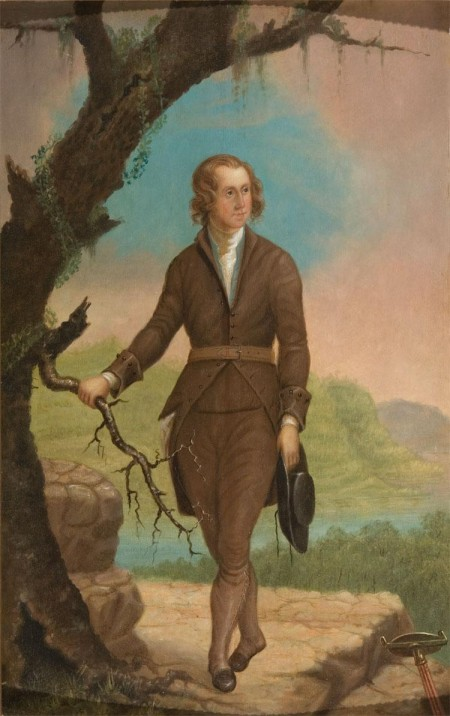There are two surviving love poems that seem to have been written by a teenaged George Washington.
At the age of 16, George Washington set out for the first big adventure of his life.

Though only a fledgling surveyor, Washington was invited to join a survey party organized by his neighbor and friend George William Fairfax of Belvoir. The opportunity was a big break; not only would Washington hone his craft as a surveyor, the experience would open the door to a lucrative career.
But the adventure would produce something else—a small notebook, only 6 × 3.75 inches, inscribed, “A Journal of My Journey Over the Mountains began Fryday the 11th. of March 1748.”
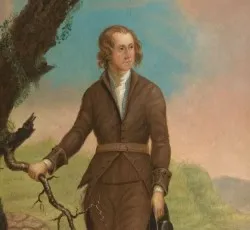
Washington's Surveying Career
George Washington's first career was as a surveyor, a respectable profession in 18th-century America that held the promise of social and financial advancement.
Learn moreThe Journal
Among the earliest writings of our Founding Father, Washington’s first journal recounts his several-week journey throughout Virginia’s Northern Neck. But it also includes something else: notes about surveying and reading, copies of correspondence, eight undated letters—and two poems that would no doubt make Washington blush.
Originals?
It should be noted that, according to the Library of Congress, “Some scholars believe Washington did not write the poems commonly attributed to him, and that he copied them from a now unknown book.”
Other scholars believe the poems to be Washington originals.
Poem #1
From your bright sparkling Eyes, I was undone;
Rays, you have, more transparent than the sun,
Amidst its glory in the rising Day,
None can you equal in your bright arrays;
Constant in your calm and unspotted Mind;
Equal to all, but will to none Prove kind,
So knowing, seldom one so Young, you’l Find.
Ah! woe’s me, that I should Love and conceal,
Long have I wish’d, but never dare reveal,
Even though severely Loves Pains I feel;
Xerxes that great, was’t free from Cupids Dart,
And all the greatest Heroes, felt the smart.
Upon first glance, the verses appear to be a straightforward love poem, the youthful pangs of a boy frustrated in love. But Washington has left a clue about the poem’s subject by writing an acrostic poem—meaning that the first letter of each line spells out a name: FRANCES ALEXA.
But who was Frances Alexa? Historians’ best guess is that Washington was four lines away from completing his poem, written in tribute to a young woman named Frances Alexander.
Upon first glance, the verses appear to be a straightforward love poem, the youthful pangs of a boy frustrated in love. But Washington has left a clue about the poem’s subject...
Who Was Frances Alexander?
While much isn’t known about the object of Washington’s love, we do know that she was born in Virginia four years before Washington and that her father, Philip Alexander, was a founder of the town of Alexandria, Virginia, just 7 miles north of Mount Vernon.1
Washington, an aspiring surveyor at that time, is known to have produced two rough maps of the future town to help encourage its growth. It is reasonable to presume that Washington would have crossed paths with Philip Alexander—and maybe his daughter Frances.
It’s not known why Washington never completed the poem. (After all, only a handful of lines remained, and he had already conquered the hardest letter, X.) Perhaps Washington’s eye was caught by another. Or perhaps his poem, which appeared under the date 1749-1750, was cut short for another reason—Frances Alexander became a married woman on February 16, 1749.
Poem #2
The inspiration for Washington’s second poem remains unknown.
Oh Ye Gods why should my Poor Resistless Heart
Stand to oppose they might and Power
At Last surrender to cupid[']s feather'd Dart
And now lays Bleeding every Hour
For her that's Pityless of my grief and Woes
And will not on me Pity take
Ile [sic] sleep amongst my most Inveterate Foes
And with gladness never with to Wake
In deluding sleepings let my Eyelids close
That in an enraptured Dream I may
In a soft lulling sleep and gentle repose
Possess those joys denied by Day.
While Washington's career as a surveyor would soon take off in earnest, his time as a poet likely stopped here; he is not known to have composed any more poems.
It should be noted, however, that Martha Washington likely burned all of her correspondence with her husband. Whether any of those letters contained a poem for his beloved bride, history will never know.
George Washington Papers, Series 1, Exercise Books, Diaries, and Surveys 1745-99, Subseries 1B, Diaries 1748-1799: Diary, March 11 - April 13, 1748 [New Calendar]. Library of Congress.
Journey Over the Mountains
Explore an interactive timeline of Washington's first surveying expedition.
Explore the TimelineFootnotes
1. Kaye, Ruth Lincoln. "First Two Hundred Years of the Alexander Family of Virginia." 1991. Page 106.
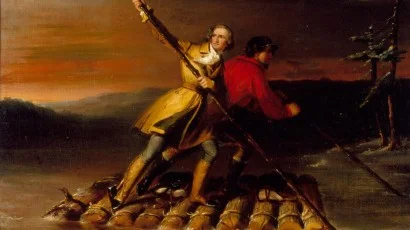
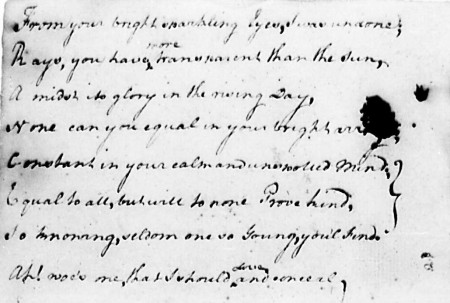
![George Washington Papers, Series 1, Exercise Books, Diaries, and Surveys 1745-99, Subseries 1B, Diaries 1748-1799: Diary, March 11 - April 13, 1748 [New Calendar]. Library of Congress.](https://mtv-main-assets.mountvernon.org/files/styles/text_image_block/s3/callout/text-image-block-full/image/sml_poem-2.jpg.webp?VersionId=ytDIeEJoLz3tS_FLBxikKOw2h9t50NRm&itok=774HdfnF)
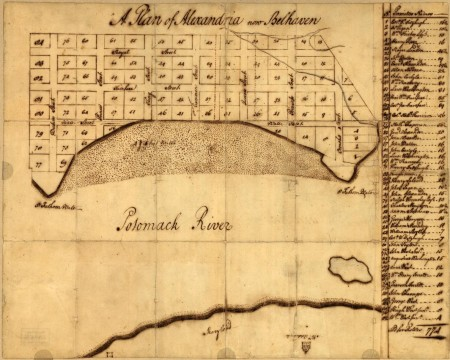
![George Washington Papers, Series 1, Exercise Books, Diaries, and Surveys 1745-99, Subseries 1B, Diaries 1748-1799: Diary, March 11 - April 13, 1748 [New Calendar]. Library of Congress.](https://mtv-main-assets.mountvernon.org/files/styles/text_image_block/s3/callout/text-image-block-full/image/sml_poem-3.jpg.webp?VersionId=f.Jn8Kldav8xuLAs8VFs675wBFuS.Y_p&itok=9_X2ks2G)
